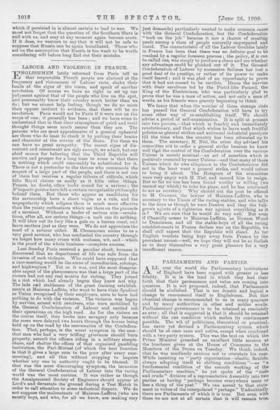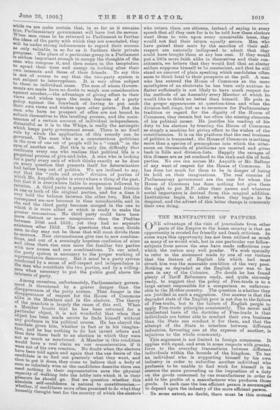PARLIAMENTS AND PARTIES.
ALL over the world the Parliamentary institutions of England have been copied with greater or less fidelity. It is in the land in which they had their birth that their permanence and value are coming into question. It is not proposed, indeed, that Parliaments should be abolished. That is too drastic and logical a change to recommend itself to Englishmen. But this identical change is recommended to us in many quarters and by many authorities in other and milder words. Parliamentary government is to be retained as resolutely as ever ; all that is suggested is that it should be retained without the one condition which makes its continuance possible. The wit of politicians, theoretical or practical, has never yet devised a Parliamentary system which should be at once sane and active, except when combined with a two-party system. This was the text on which the Prime Minister preached an excellent little sermon at the luncheon given at the House of Commons to the Metnbers of the Duma on Tuesday. We think, indeed, that he was needlessly anxious not to overstate his case. While insisting on " party organisation—elastic, flexible, always adapting itself to shifting conditions "—as " fundamental condition of the smooth working of the Parliamentary machine," he yet spoke of the "rude and crude " division of a representative Assembly into two parties as having " perhaps become everywhere more or less a thing of the past." We can assent to that state- ment in virtue of the interpolated " perhaps." Undoubtedly there are Parliaments of which it is true. But even with them we are not at all curtain that it will remain true. while we are quite certain that, in so far as it remains true, Parliamentary government will have lost its savour. When men cease to be returned to Parliament to further the ideas of the party with which they are associated, they will be under strong inducements to regard their success as only valuable in so far as it furthers their private purposes. The place of a particular group in a Parliament is seldom important enough to occupy the thoughts of the men who compose it, and then collies in the temptation to spend their time and energy in looking after then. own interests and those of their friends. To say this is not of course to say that the two-party system is not subject to interruptions. It is very often subject to them in individual cases. The men of whom Govern- ments are made have no doubt to weigh one consideration against another,—the advantage of giving effect to their views and wishes upon the main features of a party policy against the drawback of having to put aside their own views and wishes upon other points. But the men who have no prospect of office are not bound to submit themselves to this levelling process, and the main- tenance of a certain amount of individual independence, distasteful as it is to the Whips, is really the antiseptic which keeps party government sweet. There is no fixed rule by which the application of this remedy ca nbe governed. The man who is a conscientious politician in the eyes of one set of people will be a. " crank " in the eyes of another set. But this is only the difficulty that confronts every one who realises that political life is a i perpetual process of give-and-take. A man who is looking for a party every unit of which thinks exactly as he does on every question that presents itself for determination had better keep out of politics. We are inclined to say, not that the " rude and crude " division of parties of which Mr. Asquith spoke is everywhere a thing of the past, but that it is everywhere liable to suspension followed by revision. A third party is generated by internal friction in one or both of the original parties, and for a time it may hold the balance between the other two. But the consequent see-saw becomes in time unendurable, and in the end the third party becomes merged in the one to which it is more allied or which is ready to make the greater concessions. No third party could have been more distinct or more conspicuous than the Peelites between 1846 and 1852; yet they had no separate existence after 1852. The questions that most divide men to-day may not be those that will most divide them tomorrow. New circumstances give rise to new combina- tions, and out of a seemingly hopeless confusion of aims and ideas there rise once more the familiar two parties with new names and new combinations. To our mind, the party system is necessary to the proper working of representative democracy. But it must be a party system reinforced by a sense of self-respect and independence in the men who constitute the two parties, and by a willing- '? am when necessary to put the public good above the interests of party. Among ourselves, unfortunately, Parliamentary govern- ment is threatened by a graver danger than the a!sappearance of the party system. That danger is the disappearance of respect for the House of Commons alike in the Members and in the electors. The theory of the mandate is largely the cause of this evil. When a Member boasts that he has been returned for a particular object, it is not wonderful that when that object has been made secure he finds himself without any guidance in his political course. He has obeyed the mandate given him, whether in fact or in his imagina- tion, and he has nothing to do but invent others and then date them back to an election in which they were not so much as mentioned. A Member in this condition Would have a real claim on our commiseration if it were not of his own creation. No doubt when the electors have been told again and again that the one desire of the candidate is to find out precisely what they want, and then to get it done, they come to believe that a body of men so infinitely wise as the candidates describe them can need nothing in their representative save the physical capacity of walking into the lobby into which it is their pleasure he should go. But we question whether this absolute self-confidence is natural to constituencies,— whether, if candidates more often promised to do what they honestly thought best for the country of which the electors who return them are citizens, instead of saying in every speech that all they care for is to be told how these electors want them to vote upon every conceivable issue, they would not find their return equally secure. Men who have gained their seats by the sacrifice of their self- respect are naturally indisposed to admit that they could have bought them at any less cost. If they would put a little more faith alike in themselves and their con- stituents, we believe that they would find that an elector seldom supposes himself to be omniscient, and that he will stand an amount of plain speaking which candidates often seem to think fatal to their prospects at the poll. A man who has entered the House of Commons as the mete mouthpiece of an electorate he has been only anxious to flatter sufficiently is not likely to have much respect for the methods of an Assembly every Member of which he would like to think no better than himself. He puts in the proper appearances at question-time and when the division-bell rings, but as to reverence for Parliamentary tradition or regard for the dignity of the House of Commons, they remain but too often the missing elements of his political career. He justifies his reading of his duty to his electors by treating the House of Commons as simply a machine for giving effect to the wishes of the constituencies. It is on the platform that the real business of politics is transacted ; the House of Commons is nothing more than a species of gramophone into which the utter- ances on thousands of platforms are received and given back in Bills and division-lists. Happily the ravages of this disease are as yet confined to the rank-and-file of both parties. No one can accuse Mr. Asquith or Mr. Balfour of any want of respect for the House of Commons. It has done too much for them to be in danger of losing its hold on their imaginations. The real enemies of Parliamentary government are the men for whom the House of Commons has done nothing but give them the right to put M.P. after their names and whatever social importance is derived from this magical addition. Institutions begin to totter when they begin to be despised, and the advent of this latter change is commonly their own doing.



























































 Previous page
Previous page